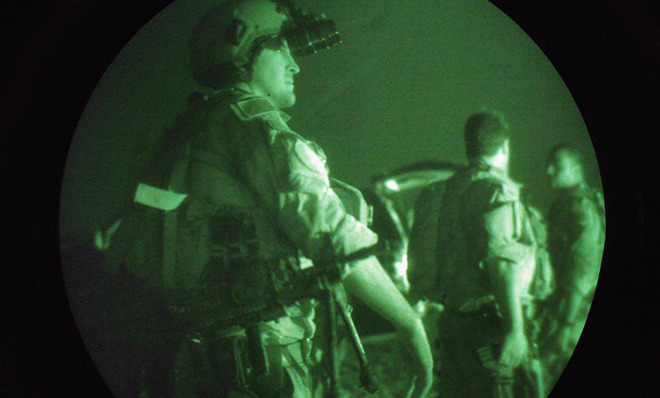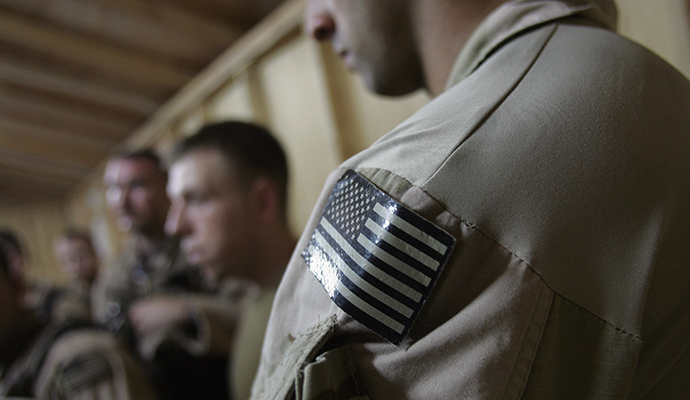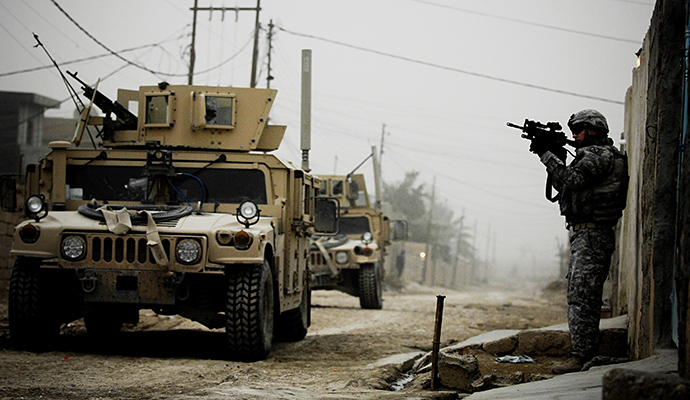Hostage rescues are extremely risky. But that doesn't mean we should stop them.
Paying ransoms is an even riskier proposition

A free daily email with the biggest news stories of the day – and the best features from TheWeek.com
You are now subscribed
Your newsletter sign-up was successful
As the eyes of the world turn to Sydney, Australia, and the developing hostage situation there, the killing of two hostages last week in Yemen is still front of mind.
The failed rescue attempt and subsequent deaths of American journalist Luke Somers and South African aid worker Pierre Korkie from al Qaeda in the Arabian Peninsula (AQAP) terrorists has spurred a widespread call for the United States to revisit its refusal to pay ransoms to secure the release of hostages.
Such arguments frequently cite other failed rescue attempts, such as the attempt in 2010, also conducted by the Naval Special Warfare Development Group (DEVGRU, aka SEAL Team Six), to rescue British aid worker Linda Norgrove in Afghanistan. She suffered grievous wounds during the course of the operation and died after being extracted.
The Week
Escape your echo chamber. Get the facts behind the news, plus analysis from multiple perspectives.

Sign up for The Week's Free Newsletters
From our morning news briefing to a weekly Good News Newsletter, get the best of The Week delivered directly to your inbox.
From our morning news briefing to a weekly Good News Newsletter, get the best of The Week delivered directly to your inbox.
On the other hand is the high-profile and dramatic rescue of Captain Richard Phillips from Somali pirates — again, by SEAL Team Six.
But this cursory look at obvious examples is incomplete. Let's go deeper.
**
It's impossible not to feel for the family of the British-born Somers. They were understandably left devastated and angry, even in the face of AQAP's promise to murder him the following day if their demands were not met.
A free daily email with the biggest news stories of the day – and the best features from TheWeek.com
The United States' stubbornness not to negotiate can seem rather callous, if not outdated and inhumane, especially when numerous European nations have taken to either paying the ransoms or at least not standing in the way of businesses or families who choose to do so.
This might make it appear all the more tragic when — as has occurred multiple times — non-American hostages are killed during the course of an American-led rescue attempt.
But step back from the raw emotions of the bereaved families. What if more Western nations joined the United States in its steadfast stance rather than the other way around?

SEAL Team Six and Delta Force are the two most elite and capable direct action units of the United States' — if not the world. While frequently called upon to perform other vitally important missions, such as high-value target hits, snatch-and-grabs, and close-target reconnaissance, these sister JSOC units effectively came into existence to rescue hostages from terrorists.
Such specialized and elite assets are required for the task because it is so demanding — a mission even other special operations forces are not considered qualified to conduct. And remember, these missions are last-ditch efforts, usually only given the green light when the hostage is considered in imminent danger. That makes an already near-impossible mission that much more challenging — a swing for the fence in the bottom of the ninth. That they sometimes come up short shouldn't be considered much of a surprise.
Historically, JSOC's hostage rescue track record was one of spectacular failure — such as Operation Eagle Claw, the failed Delta rescue attempt in Iran in 1980 — and spectacular success — such as Delta Force's successful rescue of Kurt Muse in Operation Acid Gambit from a Panamanian prison in 1989. More than anything, however, they were spectacularly rare.
That has changed since 9/11. The U.S. has mounted a whole lot of rescue missions in recent years. Some have failed. But many more have succeeded.
Somers isn't the only American to die during (or just prior to) a SEAL Team Six rescue attempt. Americans Scott and Jean Adam, Phyllis Macay, and Robert Riggle were murdered off the coast of Oman on their hijacked yacht by Somali pirates during the course of hostage negotiations, prompting an immediate raid by DEVGRU's Gold Squadron. (In fact, by the same troop that was later killed en masse when a CH-47 Chinook helicopter, call sign Extortion 17, was shot down in Afghanistan in August 2011).
Nor are Korkie and Norgove the only non-American hostages to die during a ST6 rescue attempt. In 2005, Briton David Addison was killed in Afghanistan by Taliban fighters during a mission that has been attributed to SEAL Team Six (although without confirmation).
And in 2002, Filipino nurse Deborah Yap and American Martin Burnham were killed during a rescue attempt that saved Burhham's wife, Gracia Burnham, from Abu Sayyaf rebels in the Philippines. Philippine soldiers were said to have led the raid, although it's been rumored that ST6's Gold Squadron again played a role in some capacity.
Now, Captain Phillips isn't the only American to be saved by SEAL Team Six either. The unit rescued Dr. Dilip Joseph from the Taliban in 2012, losing one of its own in the process, Petty Officer 1st Class Nicolas D. Checque.
American aid worker Jessica Buchanan — along with Danish citizen Pol Thisted — were rescued from Somali pirates earlier that same year in Operation Octave Fusion, a textbook success.
And in 2008, SEAL Team Six operators trekked through the treacherous mountains of Afghanistan's Shok Valley to rescue a 61-year-old American Army Corps of Engineers worker from Gulbuddin Hekmatyar's militant group, Hezb-i-Islami.
Similarly, Dane Thisted wasn't the only non-American saved by ST6 in recent years. In 2012, Briton Helen Johnston, Kenyan Moragwa Oirere, and two Afghan women were rescued in a joint mission with Britain's SAS in Afghanistan.
Meanwhile, as SEAL Team Six has largely focused on Afghanistan, Somalia, and Yemen, its Army counterpart has been busy elsewhere. Prior to the Foley attempt in Syria, a Delta Force squadron was mobilized and ready to launch a rescue mission in Benghazi, Libya, when it was first thought that U.S. Ambassador Christopher Stevens had been taken hostage in the assault.
Earlier, Delta played a role in the successful rescue of Colombian presidential candidate Ingrid Betancourt, Americans Marc Gonsalves, Thomas Howes, and Keith Stansell, and 11 others from FARC rebels in the rainforests of Colombia in 2008.
In 2005, Delta Force rescued American Roy Hallums from a farmhouse south of Baghdad.
And a year before that, the Unit's A Squadron successfully rescued Polish businessman Jerzy Kos, along with Italians Umberto Cupertino, Maurizio Agliana, and Salvatore Stefio, from a compound near Ramadi.
Closer to home, SEAL Team Six and Delta Force's civilian equivalent, the FBI's Hostage Rescue Team, has also been considerably busier conducting hostage rescues in recent years than at any other time in its history.
While operating on home soil simplifies matters somewhat, the actual rescues remain extremely technically difficult. HRT trains alongside JSOC's units, operates with them overseas, and utilizes similar equipment and tactics. That expertise has resulted in no less than four dramatic, successful hostage rescues conducted the HRT in the United States since February 2013.

So okay: A broader look at these operations since 9/11 shows a rather impressive overall record of success. But why even take the risk if a simple business transaction may be all that's required, eliminating the need for explosive door breaches, silenced weapons, close quarters combat, and the lives risked as a result altogether?
The problem is the business behind the transaction.
The United States' refusal to negotiate is simple enough to understand on the surface. It's meant to discourage subsequent hostage takings, whereas the payment of a ransom would only serve as positive reinforcement and spur further kidnappings.
However, if all of these hostage scenarios could be solved peacefully with a payment, while certainly irritating, wouldn't that still better than the risk of a rescue attempt?
Not necessarily. In fact, it's an incredibly dangerous tactic. Ever since the centralized al Qaeda leadership was driven, or buried, underground by the relentless pursuit of America and its allies following 9/11, the terrorist network's assets have been largely frozen and inaccessible.
The looser connections to AQ proper, such as AQAP and AQIM (al Qaeda in the Islamic Maghreb), were forced to seek other ways of generating capital — the primary method being hostage ransoms.
In October 2013, the Los Angeles Times reported that AQAP extorted $20 million in ransom money from the West during the previous two years alone.
Those millions have been used to expand AQAP's power, recruitment efforts, and reach, giving its threats to strike the West genuine teeth.
Additionally, it's worth noting that while the three rescue attempts of the past several months have been branded as failures, that wouldn't exactly make them successes from the opposition's vantage point.
During Delta Force's raid on a dry hole in Syria, while journalist James Foley was nowhere to be found, the operators killed more than a dozen ISIS fighters.
Meanwhile, during SEAL Team Six's first attempt to retrieve Somers, while the American had already been moved elsewhere, seven AQAP terrorists were killed and six Yemeni, one Saudi, and one Ethiopian hostages were freed.
And even in the raid from which Somers and Korkie ultimately perished, AQAP lost several fighters. It also not only lost its hoped for multi-million dollar payday, but the propaganda victory associated with butchering their captives on camera the following day.
Hostage rescue operations will never be easy and the risk of failure will remain frightening high. But taking them off the table altogether could serve to increase the risk to American and allied lives, both overseas and at home.
Chris Martin has covered the motorsports world since the late 90s. He's also the author of Shaping the World from the Shadows: The (Open) Secret History of Delta Force, Post-9/11 and Beyond Neptune Spear: The (Open) Secret History of SEAL Team Six, Post-9/11.
-
 Switzerland could vote to cap its population
Switzerland could vote to cap its populationUnder the Radar Swiss People’s Party proposes referendum on radical anti-immigration measure to limit residents to 10 million
-
 Political cartoons for February 15
Political cartoons for February 15Cartoons Sunday's political cartoons include political ventriloquism, Europe in the middle, and more
-
 The broken water companies failing England and Wales
The broken water companies failing England and WalesExplainer With rising bills, deteriorating river health and a lack of investment, regulators face an uphill battle to stabilise the industry